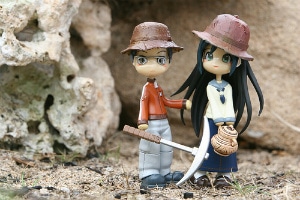David McCulloch, who won Pulitzer Prizes for his books on Harry Truman and John Adams, knows how to write a good life story. Says McCulloch, “I believe very strongly that the essence of writing is to know your subject…to get beneath the surface.” As you create your personal or family history book that’s advice you should take to heart.
Unfortunately it’s something we may forget when we set out to research our genealogy or create a family history. We turn into Joe Friday from the old TV series Dragnet who investigated by saying, “Just the facts, ma’am.” These days, there are a plethora of tools, beginning with ancestory.com and familysearch.org, to help us find more and more facts. Yet as we sleuth to gather the facts, we may miss clues to the stories that would make our family history memorable.
One of the great challenges of writing a family history is to recreate our ancestors’ experiences. What were people’s lives like? What did they believe and value? What did they enjoy, hate or fear? How did they love? Part of the job is learning as much as you can about these very real people.
Genealogy.com has created a tool that will help anyone trying to “recreate” the lives of family members. Biography Assistant is a list of topics, each with numerous questions attached to help you “get beneath the surface.”
The topics offer different insights: ones that illuminate your ancestor’s daily life, and ones that relate her life to broader historical events. Here are a few samples:
- Entertainment and Popular Culture – What was the most popular kind of entertainment of the time? What were the fashions of the day?
- The Great Depression – What is the first thing that comes to mind when she hears the word Depression now? What did she have to do without?
- Watergate – De she witness Nixon’s speech to the nation? What was her reaction to Nixon’s resignation?
There are questions to help you explore the lives of ancestors both living and dead. Employing questions like these as you research your family history can bring the names and dates on the family tree to life.
If you are fortunate enough to have relatives or family friends who knew the person you are researching you can be an “oral historian” and interview them. The questions from Biography Assistant would provide a fine list to use to guide the interview.
How else can you delve deeper? You may have letters, diaries, documents, records, and family memorabilia, including photographs. These are often sources for interesting stories and insights about the person you are researching.
Even if you don’t have artifacts from the individual, research into the times in which the person lived can provide a better understanding of their experiences that you are trying to recreate.
Local and social history books, local newspapers, and the collections of local libraries, historical societies and genealogical societies are often treasure troves of information when you set out to understand what was “beneath the surface” of your ancestors’ lives.
Facts are good, but our goal is not simply to be objective, to get “just the facts’. We want a deeper understanding; we want our families to feel the importance of our family history. When you gather and reconstruct the real life stories hidden beneath the surface of your research, you will give your family history much more meaning than facts alone can convey.


I think that’s a wish all of us share. This leaves us in the position of having to use the facts we do know to speculate on what our ancestors might have been thinking and feeling at a given moment.
Love this – just wish I’d had the sense to ask many, many more questions when I was younger.